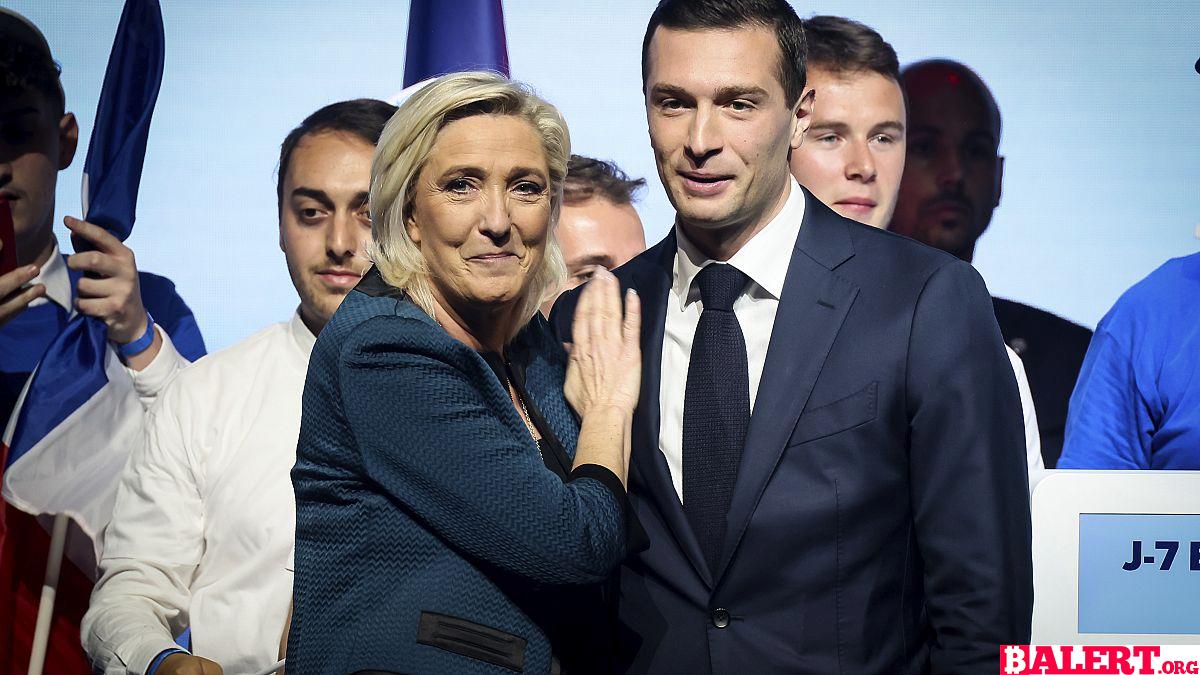World
The Far-Right’s Rise in France: Parliamentary Elections Looming
Explore the growing influence of the far-right in French politics as the country braces for the upcoming parliamentary elections. Learn about the key players and potential implications for the nation.

The latest poll indicates that the far-right in France holds approximately 36% of the vote as the country gears up for the upcoming parliamentary elections. The initial round of voting is scheduled for this Sunday, with the subsequent round set for July 7th. If the National Rally emerges victorious, France will witness its first far-right government since the dark days of Nazi occupation during World War II.
Despite the growing support for the far-right, President Emmanuel Macron has affirmed that he will not relinquish his position before the conclusion of his term in 2027.
An Ifop Fiducial survey suggests that the National Rally is poised to secure around 36% of the votes, while the Popular Front coalition, comprising centrists, leftists, and Greens, is projected to garner about 28%. Macron’s center-right party is expected to capture approximately 20% of the vote.
For a party to secure a majority in the 577-seat parliament, they must clinch at least 289 seats. The National Rally is anticipated to secure between 260 and 295 seats, indicating a significant potential shift in the political landscape.
The surging popularity of the far-right can be attributed to a sense of insecurity among the populace. Additionally, with France’s political climate deeply polarized, forming a coalition in parliament may prove challenging if no single party emerges as the clear victor.
- Message from National Rally: During a recent TV debate, 28-year-old Jordan Bardella of the National Rally conveyed a straightforward message to voters, highlighting concerns about law enforcement and the perceived strength of the state.
- Anticipated Turnout: With the stakes high for what could be a historic election, voter turnout is expected to be robust. While some are determined to see the far-right take the reins, others are equally resolute in their efforts to prevent such an outcome.
Cohabitation of Power
With President Macron’s party facing an uphill battle in the elections, a scenario of cohabitation is likely to materialize, necessitating the appointment of a prime minister from an opposing party. Should the National Rally emerge victorious, Jordan Bardella is poised to become France’s next prime minister.
During a period of cohabitation, where the president and prime minister hail from different political factions, the government’s dynamics undergo a notable shift. The last instance of cohabitation in France was witnessed under conservative President Jacques Chirac and Socialist Prime Minister Lionel Jospin from 1997 to 2002.
While the president retains certain powers in domains such as foreign policy, European affairs, and defense, the prime minister assumes a pivotal role in leading the government and shaping legislative initiatives. In the event of cohabitation, the prime minister’s policies take precedence, shaping the country’s direction.
Despite the president’s diminished influence domestically during cohabitation, they maintain authority over critical areas such as defense and foreign policy. Tensions may arise between the president and prime minister, especially concerning divergent views on key policies.
In navigating the complexities of cohabitation, past presidents have managed to find common ground with the prime minister to present a unified front on international platforms. However, the contrasting ideologies of the far-right and the leftist coalition could pose challenges in maintaining coherence on foreign policy and defense matters.
While the constitution designates the president as the head of the military, it is the prime minister who wields authority over the armed forces. In diplomatic affairs as well, the president’s scope of influence is notably constrained during cohabitation.
As France braces for a potential shift in power dynamics, the outcome of the parliamentary elections and the subsequent implications of cohabitation remain pivotal in shaping the country’s future trajectory.
World
Dominique Pelicot Testifies in Harrowing Rape Trial
Join us as Dominique Pelicot courageously testifies in a harrowing rape trial, shedding light on the complexities of trauma and justice. Her powerful story raises crucial questions about the legal system and the importance of support for survivors.

Dominique Pelicot Takes the Stand in Shocking Rape Trial
In a courtroom drama that has captivated France and garnered international attention, Dominique Pelicot, the man at the center of a harrowing rape trial, finally addressed the court. With tears streaming down his face, he recounted how his wife had been instrumental in helping him cope with a tumultuous past marked by trauma. He revealed that he had endured a sexual assault at the tender age of nine while hospitalized, and he also witnessed a gang rape during his teenage years while working as an apprentice electrician on a construction site.
“She didn’t deserve this, I acknowledge that,” Mr. Pelicot stated, his voice barely audible as he struggled to convey his emotions. The gravity of the situation weighed heavily on him, and the courtroom fell silent, straining to catch his every word.
Now 71 years old, Mr. Pelicot faces serious allegations of drugging his wife, Gisèle Pelicot, whom he has been married to for half a century, over a span of nearly ten years. Prosecutors contend that he used drugs to render her comatose, allowing him to rape her repeatedly. Furthermore, authorities allege that he went so far as to invite numerous men into their home, facilitating a nightmarish scenario where they, too, engaged in the assault of his wife.
Overall, 51 men, including Mr. Pelicot, are on trial concurrently, primarily facing charges related to the aggravated rape of Ms. Pelicot. Among them, one individual has already pleaded guilty to similar crimes, admitting to drugging his own wife to assault her and inviting Mr. Pelicot to partake in the horrific act while she was incapacitated.
Mr. Pelicot’s unexpected testimony came after a tumultuous start to the trial. Just a week in, he was stricken with severe health issues that forced him to miss four consecutive days in court. The head judge ultimately decided to postpone proceedings, as Mr. Pelicot was diagnosed with kidney stones, a kidney infection, and prostate complications, adding yet another layer of complexity to this already harrowing case.
World
Meta Bans Russian State Media Outlets from Social Media Platforms
Explore the implications of Meta’s decision to ban Russian state media outlets from its social media platforms. Understand the impact on information dissemination and the ongoing battle against misinformation in the digital landscape.

Meta Imposes Global Ban on Russian State Media Outlets
In a significant move, Meta Platforms, Inc., the parent company of Facebook, has announced the prohibition of Russian state media outlets, including RT (Russia Today) and Rossiya Segodnya, from all its social media platforms. The decision stems from the company’s concerns regarding the deceptive strategies employed by these media organizations to execute covert influence operations across the internet.
Meta made this announcement on Monday, emphasizing that the ban will be enforced worldwide across its various platforms, such as Instagram, WhatsApp, and Threads. The rollout of this ban is expected to take place over the coming days.
Statement from Meta
A spokesperson for Meta elaborated on the decision, stating, “After careful consideration, we have expanded our ongoing enforcement actions against Russian state media outlets. As a result, Rossiya Segodnya, RT, and other affiliated entities are now banned from our applications globally due to their involvement in foreign interference activities.”
For further insights into this development, watch the video in the player above.
World
Trump Recalls Alleged Assassination Attempt While Golfing
Explore Donald Trump’s chilling recollection of an alleged assassination attempt he experienced while enjoying a round of golf. Delve into the tense moments and his reflections on safety, fame, and the unpredictability of public life.

In a recent interview on the social media platform X, Republican presidential nominee Donald Trump recounted a harrowing incident he claims to have experienced while playing golf. Trump described how, during a peaceful Sunday morning round with friends, the tranquility of the day was abruptly shattered by the sound of gunfire in the air.
“It was a beautiful day, everything was just perfect,” Trump reflected. “Then all of a sudden, we heard shots being fired—probably around four or five in total.” He went on to explain that a Secret Service agent was the first to spot the suspect, who was allegedly armed with an AK-47, a powerful assault rifle.
“The agent saw the barrel of the weapon and immediately took action, returning fire at the barrel and aiming in the direction of the bushes,” Trump detailed. “I would have loved to have sunk that last putt, but we decided it was best to leave the scene promptly.”
Trump expressed his gratitude towards the agents and a vigilant civilian who aided in tracking down the suspect, who was eventually apprehended following a high-speed chase.
Suspect Faces Multiple Federal Gun Charges
The FBI has identified the suspect as Ryan Wesley Routh, accusing him of targeting Trump during his time at the golf club in West Palm Beach, Florida. According to an FBI report, Routh had allegedly hidden among the hedges of the golf course for an astonishing 12 hours. Authorities discovered an SKS-style assault rifle, a GoPro camera, and a bag of food at the scene.
The 58-year-old Routh is now facing two serious federal gun charges. If convicted on both counts, he could face a combined maximum sentence of 20 years in prison. Notably, neither of the charges is directly related to an assassination attempt. The first charge pertains to possessing a firearm despite a prior felony conviction, which carries a potential 15-year sentence, a fine of $250,000 (€225,000), and three years of supervised release.
The second charge involves possession of a firearm with an obliterated serial number, which could result in a five-year prison term, the same financial penalties, and also three years of supervised release. As the investigation continues, additional charges could be forthcoming.
While the motive behind Routh’s actions remains unclear, his digital footprint reveals strong political affiliations, particularly concerning issues surrounding Ukraine and China. Routh consistently expressed support for Ukraine across various social media platforms, even claiming to have orchestrated a recruitment scheme for international volunteers aiming to assist Ukraine in its fight against Russia’s invasion. This behavior has been denounced by Ukrainian soldiers and members of the International Legion, who disavowed Routh’s actions and motives.
-

 Business4 months ago
Business4 months agoThe Significance of Jackson Hole: A Central Banking Tradition
-

 Business6 months ago
Business6 months agoObituary: Dan Collins
-

 Tech3 months ago
Tech3 months agoNew Leaks and Features About the Samsung Galaxy S25 Ultra
-

 Article6 months ago
Article6 months agoCreative Design Applications Developed with Artificial Intelligence
-

 Gaming6 months ago
Gaming6 months agoMore than a thousand students vowed not to work for Amazon and Google due to the Nimbus Project.
-

 Business3 months ago
Business3 months agoBhutan’s Strategic Investment in Bitcoin: A New Era for the Himalayan Kingdom
-

 World6 months ago
World6 months agoRussia and North Korea Strengthen Defense Ties
-

 World4 months ago
World4 months agoLa Transformación Política en Tailandia: Desafíos y Nuevas Direcciones












